|
De Franse dichter en schrijver Jacques Bens werd geboren op 25 maart 1931 in Cadolive (Bouches-du-Rhône). Zie ook alle tags voor Jacques Bens op dit blog.
Melancholy
So I’ll once more find my old horizons,
cherished scent of winds and habitations.
Fear not if it seems I’m quitting the place.
I leave Paris just to love it better.
One tends to hurry a banal embrace.
But what’s this pride worth that’s past all seasons?
Try to unite the heart with its reasons.
The city, while smiling, leaves a rough trace.
I leave Paris just to love you better.
To love you better, I couldn’t picture—
Now I see the present whisks us away.
To see you, I have to step back a bit.
I lock up my regrets, as will be fit,
Slipping my key under your entryway.
Nostalgia
I’ll no longer haunt this lost location
Where my friends, gently, find some fixation,
Fixation I crave, though I play the stud,
For I love the smell of books most of all.
If I’ve swapped my pen for a plow and mud
(That is, lyric and inoculation),
If I’ve, I say, chosen field plantation,
I’ve not renounced my écriveron blood:
Still, I love the smell of books above all.
To regain that world that had me in thrall,
To meet, each day, my cousin the proofer!
To sniff the cold perfume of leather scrawl!
To relive, at last, the life I recall,
And egads! return like a proud victor!
Vertaald door Rachel Galvin
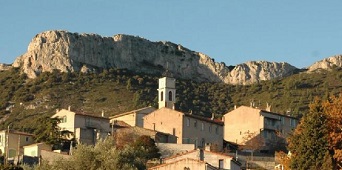
Jacques Bens (25 maart 1931 – 26 juli 2001)
Cadolive (Bouches-du-Rhône)
De Franse dichter en schrijver Jacques Audiberti werd geboren op 25 maart 1899 in Antibes. Zie ook alle tags voor Jacques Audiberti op dit blog.
Si je meurs
Si je meurs, qu'aille ma veuve
à Javel prés de Citron.
Dans un bistrot elle y trouve,
à l'enseigne du Beau Brun,
trois musicos de fortune
qui lui joueront - mi, ré, mi
l'air de la petite Tane
qui m'aurait peut-être aimé
puisqu'elle n'offrait qu'une ombre
sur le rail des violons.
Mon épouse, ô ma novembre,
sous terre les jours sont lents.
Parnasse
Mon train filait avec cette allure qu'il prend
pour fuir, nocturne, l'heure où grouille le parent.
Il traversait une forêt. Contre les baies
elle appendait un bloc de cimes recourbées,
tapisserie obscure aux dévidoirs profonds.
Quoique ganache en cerfs, sentiers, cèpes et fonts,
moi, pourtant, je savais, à trois jours de la voie,
un arbre, que jamais pour de bon je ne voie !
Il porte, sur son tronc funèbre, un chapelet
de masques ciselés à coups de pistolet
par le nègre en rupture et le bûcheron ivre.
Je me rendai pour rapporter, car il faut vivre,
à Melun, qui n'est pas un lieu phénoménal.
Là, sous une muraille, au bord de tel canal,
quelque chose s'était passé, mais quoi ? La veille
plutôt que dépouiller la presse, humble merveille,
j'avais, fruit sec du rêve et du nombre, établi
combien de tomes lus peut supporter mon lit
sans crouler aux lamas qui bêlent sous son ventre.
J'arrivai dans Melun où, tout de suite, m'entre
la ronce du mystère éclos dans tous les creux.
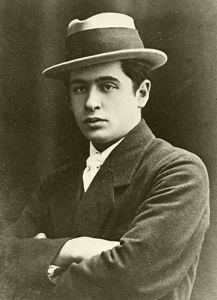
Jacques Audiberti (25 maart 1899 – 10 juli 1965)
De Vlaamse schrijver Filip De Pillecyn werd te Hamme aan de Durme geboren op 25 maart 1891. Zie ook alle tags voor Filip De Pillecyn op dit blog.
Uit: Mensen achter de dijk
“De wind strijkt vanuit de Durmevallei over het dorp. Ik hoor hem zoeven daar ik loop, geborgen onder moeders lakense kapmantel. Ik schrijd veilig en gelukkig naast haar in de warme duisternis die mij afsluit van de wereld. Moeders hand is vol rustig, innig leven en zonder te zien waar ik ga, klem ik die hand in de mijne en zie in mijn verbeelding de huizen waarlangs wij gaan. De lage werkmanshuisjes van de Kapellestraat met wat verder een boerenwoning die gaandeweg verloren staat in het dorp; en de winkels waaruit nu de lichtschijn valt over de straat. Ik hoor de stap van mensen naast mij, een winkeldeur gaat met belgerinkel open.
- Pas op, de goot, zegt moeder.
Ik trek de mantel open, op een kier om zo te zeggen. De valavond en de wind en het gerucht van de straat zijn meteen weer rondom mij. Ik stap over de goot die de straat dwarst en het dikke, flauwe licht van de lantaarn glimt in het donkere water. Ik trek de mantel weer dicht en wandel voort in mijn wereld vol warme, geheimzinnige vereenzaming.
Het is alsof de geur van de kerk nog rondom mij hangt; zware wierooklucht en die mist van verstorvenheid die ernstig en treurig maakt. Als moeder tijd heeft gaat zij naar het lof en ik ga mee; als wij terugkomen is het duister en dan ga ik aan haar hand, onder de warme, donkere mantel naar huis. Het is de maand oktober en de vrouwen gaan sterkte zoeken in de rozenkrans. Het gemurmel van hun gebed stijgt rondom mij, hun gestalten zijn zwaar en onbeweeglijk in de gele schemervlekken van kaars en lamp. En van zohaast wij in het kerkportaal zijn glijd ik onder moeders mantel Zo ga ik van de kerk naar huis, afgesloten van de mensen, en alleen de warme, weke druk van moeders hand weerhoudt mij in de werkelijkheid.
Ik stel mij voor hoe moeder stapt. Hoog opgeschoten en statig in de zware lakense mantel die tot aan de hielen reikt; edele, zwarte stof die een leven lang haar dienst doet. De satijnen muts met binders staat op haar dicht blond haar dat achter aan het hoofd in een dikke wrong is samengevlochten. Ik hoor ze soms goên avond zeggen en ik tracht, aan de klank van de stem, te raden wie haar groet. Maar de woorden komen verdoft en ver tot mij.”
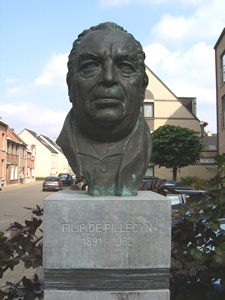
Filip De Pillecyn (25 maart 1891 – 7 augustus 1962)
Borstbeeld in Hamme
De Zwitserse schrijfster en beeldhouwster Erica Pedretti werd geboren op 25 maart 1930 in Šternberk (Tsjechië). Zie ook alle tags voor Erica Pedretti op dit blog.
Uit: Fremd genug
„Und statt der gluschtigen Fasnachtschüechli, die meine Schweizer Großmutter jeden Winter, etwa zur Zeit meines Geburtstags, also gerade jetzt, zu Hause korbweise buk, auf die ich mich gefreut hatte, wenn ich schon in die Schweiz, wo es doch noch und noch Fasnachtschüechli geben sollte, in ein Kinderheim mußte, statt Fasnachtschüechli gab es hier Griesbrei mit Zimt und Zucker, alle Tage zum Frühstück. Zuunterst am langen Tisch saß ich, immer als Letzte vor dem noch vollen Teller, und was ich morgens nicht schaffte, das bekam ich wieder zu Mittag. Seither ist mir Griesbrei zuwider, und beim Geruch von Zimt sehe und höre ich kleine, mit ihrem Besteck in den Tellern klappernde Kinder in einem holzgetäfelten Speisesaal. Wann endlich würden meine Eltern aus der Tschechoslowakei kommen und mich abholen?
Immer wieder durfte eins der Kinder abreisen, glücklich und beneidet, und das Fräulein, das sie mit der Bergbahn hinunter nach Vitznau gebracht hatte, erzählte dann von den schönen, tränenreichen Wiedersehen mit den Müttern. In Gedanken probte ich meine Abreise, wollte eine ebenso rührende Wiedersehensszene bieten. Doch damit war dann nichts: ein Kuß von der Mutter, ein Kuß vom Vater. Meine Eltern hatten gar keinen Sinn für Sentimentales.
Wieder zu Hause, wurde ich von meiner Schweizer Großmutter, die vis-à-vis wohnte, auf schweizerdeutsch begrüßt. Das hatte ich im Kinderheim mehr oder weniger gelernt und konnte es jetzt, den spöttischen ch, ch, ch der Geschwister und Eltern zum Trotz, als Geheimsprache mit der Omi verbessern.
Wie gahts? Hesch guet gschlafe, und was mache mir hüt? rief sie aus ihrem Fenster herüber.
Zu Hause durfte man sonst keinen Dialekt, auch keinen einheimischen Dialekt sprechen, nur fern des Vaters, auf der Straße, und dorthin durfte ich mit vier Jahren noch nicht. So wurde Schweizerdeutsch, wahrscheinlich das aargauische, denn meine Großmutter kam aus Aarau, mein erster Dialekt. Den ich dann leider wieder vergaß, als die Omi zügelte, zurück in die Schweiz.“
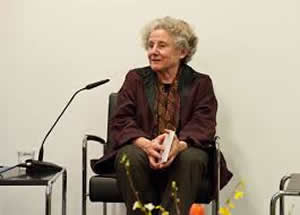
Erica Pedretti (Šternberk 25 maart 1930)
De Turkse schrijver Evliya Çelebi werd geboren op 25 maart 1611 in Istanbul. Zie ook alle tags voor Evliya Çelebi op dit blog.
Uit: Narrative of Travels in Europe, Asia, and Africa, in the Seventeenth Century (Vertaald door Joseph von Hammer)
“It was built by a Greek Princess called Modína. Here I was first enabled to perform my Friday’s prayer, which I did with great devotion, and then went forth to view the town. It is the port of Brússa, and forms a safe harbour, being closed against the wind from seven points and open only to the North. The anchorage is excellent. At the head of the harbour stands the custom-house, the lease of which amounts to a million aspers. The town is built by the sea-shore,3 on a low rocky ground. Prince Orkhán, with his father Osmán’s permission, conquered this town in the year 721 (1321) and destroyed the walls in several places, that it might no longer afford shelter to the infidels. It is governed by a Voivode, subordinate to Brússa, the chief seat of the Sanjak of Khodávendkiár. The judge is appointed with one hundred and fifty aspers a day. His annual revenue amounts to two thousand piastres. This appointment is sometimes given to the Mollá of Brússa as Páshmáklik (pin-money). The houses are all faced with brick. There are three mosques (jámí) and seven mesjids, three kháns, one bath, two schools for boys, and two hundred small streets; but no room for reading the Korán or tradition, because the greater number of the inhabitants are Greeks. There are fine gardens producing superior figs and grapes. From the excellence of its vinegar, it has acquired the name of Dárkhill (vinegar-house). South-east of the town we passed on horseback continuously through gardens and the cultivated field called Filehdár. The river Nílúfer, not fordable in the beginning of spring, is a clear stream, which issuing from the mountains Rúhbán, Ketelí and Castel, waters the valley of Fillehdár and disembogues into the White Sea. The main road crosses it over a handsome bridge, each arch of which resembles the arch of heaven; its name, as well as that of the river, was received from its builder the Princess Nílúfer, daughter of a Sultán (Orkhán): after continuing our journey among gardens and vineyards for two hours, we reached the town of Brússa, the emporium of silk, the ancient capital of this country (Bithynia).”
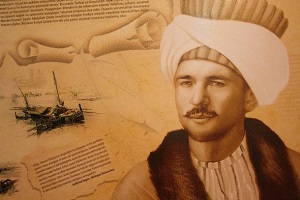
Evliya Çelebi (25 maart 1611 – na 1683 op een van zijn reizen)
De Engelse schrijfster Lady Anne Fanshawe werd geboren op 25 maart 1625 in Balls Park, bij Hertford. Zie ook alle tags voor Anne Fanshawe op dit blog.
Uit:The Memoirs of Lady Fanshawe
“Now you will expect that I should say something that may remain of us jointly, which I will do though it makes my eyes gush out with tears, and cuts me to the soul to remember, and in part express the joys I was blessed with in him. Glory be to God, we never had but one mind throughout our lives. Our souls were wrapped up in each other's; our aims and designs one, our loves one, and our resentments one. We so studied one the other, that we knew each other's mind by our looks.
Whatever was real happiness, God gave it me in him; but to commend my better half, which I want sufficient expression for, methinks is to commend myself, and so may bear a censure; but, might it be permitted, I could dwell eternally on his praise most justly; but thus without offence I do, and so you may imitate him in his patience, his prudence, his chastity, his charity, his generosity, his perfect resignation to God's will, and praise God for him as long as you live here, and with him hereafter in the Kingdom of Heaven. Amen.
Your father was born in Ware Park, in the month of June, in the year of our Lord 1608, and was the tenth child of Sir Henry Fanshawe, whose father bought Ten, in Essex, and Ware Park, in Hertfordshire. This, your great-grandfather, came out of Derbyshire from a small estate, Fanshawe-Gate, being the principal part that then this family had, which exceeded not above two hundred pounds a year, and about so much more they had in the town and parish of Dronfield, within two miles of Fanshawe-Gate, where the family had been some hundreds of years, as appears by the church of Dronfield, in the chancel of which church I have seen several grave-stones with the names of that family, many of them very ancient; and the chancel, which is very old, was and is kept wholly for a burying-place for that family.”
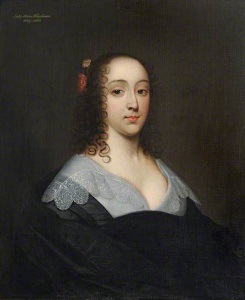
Anne Fanshawe (25 maart 1625 - 1680)
Portret door Cornelis Janssens van Ceulen, ca. 1644-1661
De Duitse dichter en schrijver Daniel Schiebeler werd geboren op 25 maart 1741 in Hamburg. Zie ook alle tags voor Daniel Schiebeler op dit blog.
Das Glockenspiel
Hörst du den feyerlichen Klang?
Empfindung füllt mein Herz,
Die es noch nie zuvor durchdrang,
Entzücken, Andacht, Schmerz!
O Daphne, dieser Augenblick
Bekrönt ein liebend Paar,
Es schwört sich seines Lebens Glück
Am heil'gen Traualtar.
Belohnt ist nun der Tage Reih,
In Seufzern hingebracht,
Und jede, der Melancholey
Geweihte, lange Nacht.
Sieh diese Thräne, welche mir
Durchs Auge zitternd bricht!
Dein Herz, o Daphne, sag' es dir,
Was diese Thräne spricht!
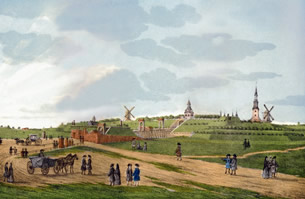
Daniel Schiebeler (25 maart 1741 – 19 augustus 1771)
Hamburg vanaf de kant van het Altonaer Tor in 1700
De Engelse dichteres en schrijfster Mary Webb werd geboren als Gladys Mary Meredith in Leighton, Shropshire op 25 maart 1881. Zie ook alle tags voor Mary Webb op dit blog.
Green Rain
Into the scented woods we'll go,
And see the blackthorn swim in snow.
High above, in the budding leaves,
A brooding dove awakes and grieves;
The glades with mingled music stir,
And wildly laughs the woodpecker.
When blackthorn petals pearl the breeze,
There are the twisted hawthorne trees
Thick-set with buds, as clear and pale
As golden water or green hail-
As if a storm of rain had stood
Enchanted in the thorny wood,
nd, hearing fairy voices call,
Hung poised, forgetting how to fall.
The Night Sky
The moon, beyond her violet bars,
From towering heights of thunder-cloud,
Sheds calm upon our scarlet wars,
To soothe a world so small, so loud.
And little clouds like feathered spray,
Like rounded waves on summer seas,
Or frosted panes on a winter day,
Float in the dark blue silences.
Within their foam, transparent, white,
Like flashing fish the stars go by
Without a sound across the night.
In quietude and secrecy
The white, soft lightnings feel their way
To the boundless dark and back again,
With less stir than a gnat makes
In its little joy, its little pain.
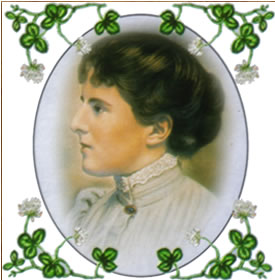
Mary Webb (25 maart 1881 – 8 oktober 1927)
25-03-2017 om 00:00
geschreven door Romenu 
Tags:Jacques Bens, Jacques Audiberti, Filip De Pillecyn, Erica Pedretti, Evliya Çelebi, Anne Fanshawe, Daniel Schiebeler, Mary Webb, Romenu
|

